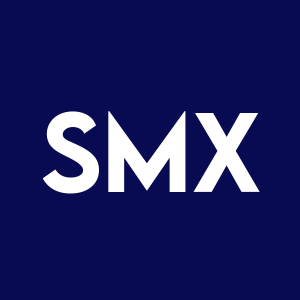Welcome to our dedicated page for SMX news (Ticker: SMX), a resource for investors and traders seeking the latest updates and insights on SMX stock.
SMX (Security Matters) PLC delivers cutting-edge solutions for supply chain authentication through proprietary molecular marking technology. This page serves as the definitive source for company news, providing investors and industry professionals with timely updates on strategic developments.
Access press releases covering earnings reports, technology partnerships, product launches, and sustainability initiatives. Our curated collection ensures you stay informed about SMX's advancements in enhancing traceability standards across manufacturing, pharmaceuticals, and circular economy systems.
Key updates include regulatory milestones, innovation disclosures, and operational expansions. All content is verified for accuracy and relevance to support informed decision-making. Bookmark this resource for direct access to SMX's evolving role in securing global supply chains through physical-digital verification systems.
SMX (NASDAQ:SMX) is using partnerships to open entire markets by embedding its identity verification platform inside existing ecosystems rather than entering markets directly. Each partner provides gated access to producers, processors, brands, and regulators so the same identity framework can be reused across plastics, textiles, metals and other materials with minimal adaptation.
This approach aims to improve capital efficiency, shorten validation-to-monetization timelines, and create a portfolio effect where adoption in one sector reduces friction in others.
SMX (NASDAQ:SMX) argues its recent partnerships are designed to embed verification capability into existing supply chains and industry hubs rather than merely signal interest. By integrating at aggregation points, SMX aims to scale reach without proportional cost increases, compress sales cycles, and accelerate adoption through inherited access.
The company says partner selection creates leverage, raises informal standards, increases switching costs, and can turn verification from optional to assumed — a dynamic that may drive valuation expansion as networks normalize usage.
SMX (NASDAQ:SMX) describes a unified value proposition: an identity layer embedded in physical materials that enables traceability, auditability, and verification across plastics, textiles, metals and other supply‑chain use cases. The company frames this capability as infrastructure that scales horizontally without reinvention, where validation, partnerships, and capital efficiency reinforce one another in a circular loop. SMX argues its value compounds across markets as adoption normalizes and valuation shifts from isolated deals to strategic positioning.
SMX (NASDAQ:SMX) announced a jurisdiction-focused strategy to rebuild trust in the gold supply chain by embedding authentication and identity infrastructure at national scale.
Key elements include collaboration with the Dubai Multi Commodities Centre, a partnership with Bougainville Refinery Ltd, integration with digital identity provider FinGo, and deployment of SMX's molecular-level authentication and its majority-owned TrueGold subsidiary to create verifiable gold linked to biometric human identity and auditable workflows.
The approach aims to move trust from individual claims to systemic, jurisdictional enforcement across sourcing, refining, and export.
SMX (NASDAQ:SMX) announced a joint initiative with Bougainville Refinery Ltd and biometric provider FinGo to embed identity infrastructure across gold supply chains, announced December 23, 2025. The program pairs SMX's molecular authentication—an invisible, persistent identity embedded into gold that survives refining—with FinGo's biometric digital identity for verified human custody attribution.
Deployment is active inside Bougainville's licensed refinery environment and targets artisanal and remote supply-chain points to improve KYC/AML compliance and transform provenance records into verifiable event histories.
SMX (NASDAQ:SMX) is moving gold compliance from back-office reporting into operational supply chains by embedding persistent physical-to-digital identity into gold and linking custody to verified human identity.
Key actions include an engagement with the Dubai Multi Commodities Centre, live deployments with Bougainville Refinery Ltd and digital identity partner FinGo, and advancement of the majority-owned trueGold platform to preserve provenance through refining and trade.
The combined technology aims to make compliance continuous at handoffs, enable KYC/AML-aligned attribution, and demonstrate enforcement without slowing trade.
SMX (NASDAQ:SMX) announced two industry alliances on December 22, 2025 that expand its verified-gold identity framework into operational supply chains. The company said it is partnering with Bougainville Refinery Ltd and biometric identity provider FinGo, and is building on prior alignment with the Dubai Multi Commodities Centre (DMCC).
SMX described its trueGold platform and molecular-level authentication that embeds a persistent identifier into gold so provenance, custody, and verified human custody events can be auditable across refining and trade.
SMX (NASDAQ:SMX) announced a joint initiative with FinGo and Bougainville Refinery Ltd to pilot an integrated physical-to-digital authentication and biometric identity framework for the global gold supply chain on December 22, 2025.
The project combines SMX's molecular-level material authentication, FinGo's biometric digital identity aligned to KYC/AML, and Bougainville's licensed refinery workflows to embed verifiable provenance and auditable custody into live operations rather than relying on paperwork alone.
This effort aims to demonstrate operational deployment across sourcing, refining, and export and to create a repeatable model for jurisdictional-scale transparency.
SMX (NASDAQ:SMX) announced a joint initiative with FinGo and Bougainville Refinery Ltd on December 22, 2025, to evaluate an integrated physical-to-digital framework for authenticating gold from mine to export.
The program pairs SMX's molecular-level gold authentication, FinGo's biometric Human Identity-as-a-Service (HIDaaS) for KYC/AML, and BRL's refinery operations to create tamper-resistant digital provenance, auditable compliance records, and verified custody transfers aligned with LBMA, DMCC, and World Gold Council guidance.
SMX (NASDAQ:SMX) positions its molecular identity technology as a structural solution for cannabis companies facing stricter federal oversight as of December 19, 2025. The company argues cannabis systems were built for speed, not durable compliance, and says embedding identity at the material level preserves verification across transformations from flower to formulations.
SMX notes its molecular marking is already deployed in recycled PET used for food-contact applications operating within 21 CFR food-contact regulations, and frames that track record as evidence the technology can meet the continuity and chain-of-custody expectations regulators require.


